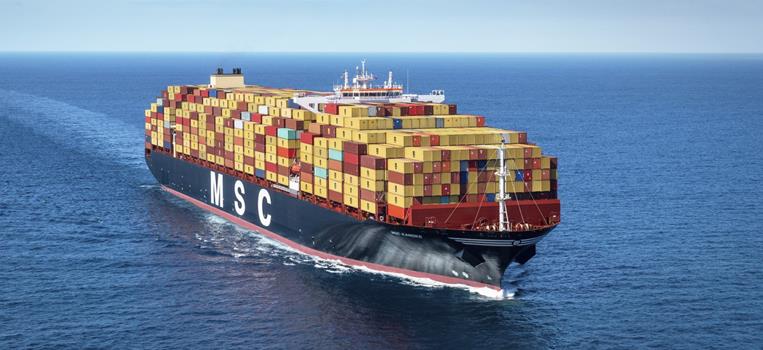Unilever, consumer giants push for seafarers to get off ships
Unilever Plc and Procter & Gamble Co. are among consumer companies urging world leaders to resolve the plight of more than 300,000 seafarers stuck on commercial vessels, where forced labor and deteriorating working conditions threaten to disrupt the global supply chain.
Chief executives of household consumer brands, from retailer Carrefour SA to food manufacturer Mondelez International Inc. and beverage maker Heineken NV, have signed an open letter calling for measures to allow more crew changes at ports, ensure the safety of overworked seafarers and make sure supply chains don’t use forced labor.

The letter, which was sent to United Nations Secretary-General Antonio Guterres Wednesday before a General Assembly web conference on seafarers, is the latest call to address a growing humanitarian crisis at sea brought about by the Covid-19 pandemic as cautious governments restrict access to borders and air travel remains curbed. An earlier Bloomberg investigation found numerous violations of international maritime law designed to protect seafarers, including wage and labor problems highlighted by interviews with more than 40 crew members globally.
“We are coming to a tipping point if we don’t resolve the issue of crew changes,” Marc Engel, chief supply chain officer at Unilever, which spearheaded the letter, said in an interview. “There’s a huge risk that the global supply chain will start failing. It’s an inadvertent situation of forced labor because these seafarers are stuck on these ships. It’s a human rights issue.”
The call to action by more than two dozen CEOs—members of the powerful Consumer Goods Forum that represents 400 of the biggest consumer retailers, manufacturers and service providers—is one of the strongest appeals by business titans to draw attention to the seafarer crisis.
More than eight months since the pandemic unfolded, the backlog of crew swaps threatens to get worse. More than 120 countries or territories have stopped or limited access for ships to conduct seafarer changes in a bid to prevent the spread of the novel coronavirus that’s killed almost 1 million across the globe.
“This has led to a major disruption of global supply chains, which are vital to manufacturers and retailers and their ability to produce and offer essential consumer goods, including food and hygiene products,” the CEOs said in the letter.
To ensure the supply of critical goods and protect seafarers’ human rights, the CEOs are calling for measures that include:
- Introducing a robust test and trace regime to ensure the safety of seafarers and crew changes
- Limiting any unavoidable crew contract extensions to the next scheduled port where crew change is possible and/or diverting course to a port where crew changes can be arranged within the International Labour Organization’s guidelines
- Signatories communicating the request for the measures to their shippers, logistics providers and suppliers, and the Consumer Goods Forum will encourage all stakeholders to abide by labor principles
In Bloomberg interviews with more than 40 seafarers on as many ships, half said they didn’t have current contracts, and some said they hadn’t been paid in more than two months. Engel said violations of overtime and non-payment of wages are particularly concerning since they are basic protections that aren’t affected by pandemic restrictions. Unilever’s procurement staff recently started to question its supply chains about seafarers’ conditions, and are in discussions to ensure no infractions are occurring, he said.
Complicated System
Shipping companies and the industry benefit from a complicated and fragmented system that rewards on-time deliveries over the welfare of nearly invisible workers. Every ship is connected to a handful of separate entities. Typically, there’s the vessel’s owner, its operator, a staffing agency that recruits seafarers, and the charterer—the company that hires the boat to get goods from point A to point B.
Those layers make it hard to hold anyone accountable for on-board working conditions, said Richard Meade, managing editor of U.K. shipping researcher Lloyd’s List.
“We’re all participating in the global supply chain—we’ve made commitments to use supply chains that are free of human rights violations,” Engel said. “We need to do everything to help these seafarers.”
Similar Stories
AGLPA Issue Update - Nov 2024
Today the Maritime Administration (MARAD) awarded nearly $580 million to 31 recipient ports in 15 states and territories. These grants are from the agency's Port Infrastructure Development Program (PIDP). Five…
View Article
Viking Line named Finnish security organization of the Year
View Article
Ocean Network Express and Seaspan Corporation jointly announce the establishment of ONESEA Solutions
View Article
MSC Customer Advisory
View Article
ZIM launches its USA Employer Brand Campaign to attract top talent
View Article
Hapag-Lloyd achieves good result in first three quarters of 2024
View ArticleGet the most up-to-date trending news!
SubscribeIndustry updates and weekly newsletter direct to your inbox!





